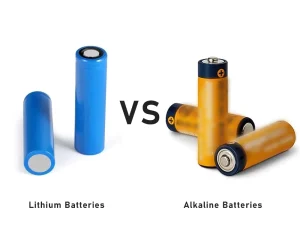When you walk down the battery aisle at any store, you’ll see two main types on the shelves: lithium and alkaline batteries. Lithium VS Alkaline batteries, what is the difference? Many customers find it hard to choose between them. With customer satisfaction in mind, we have created this guide to help you select the best battery for your devices.
Alkaline Batteries
Alkaline batteries are the most common type found in homes worldwide. They get their name from the alkaline liquid inside them (mostly potassium hydroxide).

The debate between alkaline VS lithium batteries starts with how alkaline batteries function. Inside an alkaline battery, several parts work together to make electricity. The negative side contains zinc powder, while the positive side uses manganese dioxide. A special paper barrier separates these materials, allowing electricity to flow through. All of this sits inside a protective steel case.
When new, alkaline batteries start at 1.5 volts. However, this power gradually decreases as the battery is used. That’s why some devices get slower before the battery dies completely.
Most alkaline batteries are made for one-time use only. Once their chemicals are used up, you dispose of them. Some companies make rechargeable alkaline batteries. But these are rare and don’t last as long as other rechargeable types.
Lithium Batteries
Lithium batteries use more advanced technology than alkaline ones. They use lithium, which is the lightest metal known to science. This special metal enables lithium batteries to store significantly more power in a smaller, lighter package.
They come in two main types: disposable and rechargeable lithium-ion batteries.

When comparing lithium VS alkaline batteries, disposable lithium batteries use pure lithium metal. This makes them lighter and more powerful than alkaline batteries. However, like alkaline batteries, they are designed for single use.
Lithium-ion batteries can be charged hundreds of times. The lithium particles move back and forth between the sides when the battery is charged and used. This back-and-forth movement is what makes recharging possible.
Lithium batteries power many modern devices. They run smartphones, laptops, electric cars, and energy storage systems. Legend Batteries has made lithium batteries that work well even in harsh conditions.
Difference Between Lithium and Alkaline Batteries
1. Energy Density and Power Output
The difference between these batteries is evident in the amount of energy they store. Lithium batteries pack much more energy into the same space. This means lithium batteries last longer in devices that require a lot of power, such as digital cameras.
Lithium batteries also start at 1.7V and maintain their voltage steady throughout their lifespan.
Alkaline batteries slowly lose power as they drain. Devices powered by lithium batteries continue to work until the battery is completely depleted.
Lithium batteries can deliver more power quickly when needed. Alkaline batteries are better suited for devices that require steady, low power over an extended period. Your choice depends on what type of device you’re powering.
2. Temperature Performance
Lithium batteries perform well in both hot and cold weather. They can operate from -40°F to 140°F (-40°C to 60°C), but this range varies depending on the manufacturer and chemical composition.
Alkaline batteries struggle in such extreme temperatures. Cold can reduce alkaline battery performance by up to 50%.
Hot temperatures also damage alkaline batteries more than lithium ones. That’s why lithium batteries are better for devices left in cars or used in hot places.
But, as a basic prerequisite, both battery types should be stored at room temperature when possible.
3. Lifespan and Shelf Life
Lithium batteries last 2-4 times longer than alkaline batteries in most devices. They also have an amazing shelf life of 10-12 years when stored properly.
Alkaline batteries usually last 5-10 years on the shelf before losing power. However, once you start using them, they drain faster than lithium ones.
In general, lithium batteries offer better value for frequently used devices.
Lithium batteries also keep their charge better during storage. This makes them ideal for emergency devices that remain unused for extended periods of time.
4. Weight and Size
Lithium batteries weigh much less than alkaline batteries of the same size. This weight difference matters in portable devices where every ounce counts.
For example, lithium AA batteries VS alkaline batteries show a clear weight advantage for lithium. Lithium AA batteries weigh about 40% less than alkaline AA batteries. Hence, they are used in hiking gear, cameras, and other portable equipment.
Some lithium batteries can be made smaller and keep the same power output. This allows for more compact device designs. However, standard lithium VS alkaline batteries usually come in the same sizes.
5. Cost
Another major factor in the debate between alkaline VS lithium batteries is cost. At initial purchase, alkaline batteries cost much less than lithium batteries.
However, lithium batteries provide better value over time despite costing more upfront. Their longer lifespan means you buy fewer batteries overall.
Lithium batteries can help you save a significant amount of money on devices that consume a lot of power. For low-power devices, alkaline batteries may be a more cost-effective choice.
When to Choose Alkaline Batteries
Alkaline batteries are best suited for devices that require minimal power and are used infrequently. They’re perfect for everyday household items that you use occasionally.
Alkaline batteries are ideal for low-power devices around your home. These include TV remotes, cable box controllers, wall clocks, and desk clocks. Kitchen timers, cooking thermometers, and bathroom scales also work well with alkaline batteries.
Children’s toys like handheld electronic games and remote control cars also use these batteries.
Alkaline batteries also work well for emergencies. Walkie-talkies, portable AM/FM radios, and weather radios are good examples.
They are available everywhere, making them convenient for last-minute needs. They’re also safe and easy to dispose of through regular recycling programs. This makes them practical for everyday use.
When to Choose Lithium Batteries
Lithium batteries are best suited for devices that require a lot of power or operate in harsh environments. When your device absolutely cannot fail, lithium batteries are your best choice.
For example, digital cameras and professional photo equipment use power very quickly. Therefore, they need lithium batteries to work properly.
Similarly, high-powered LED flashlights and tactical lights need the extra energy that lithium can provide. GPS units for navigation also depend on this reliable power source. Wireless computer mice and game controllers perform much better with lithium power. Electronic testing equipment also needs the steady energy that lithium provides.
When it comes to outdoor activities, camping and hiking gear must have batteries that won’t quit in harsh weather. Weather stations and outdoor security cameras face the same challenge.
It’s a necessity for safety devices like smoke detectors and carbon monoxide alarms never to fail. That’s why manufacturers design them to be suitable for lithium batteries. Home security systems also depend on lithium batteries for reliable protection.
While lithium batteries may be more expensive initially, they prove their worth over time. Their steady power means your important devices won’t let you down when you need them most.
Environmental Impact: Lithium VS Alkaline Batteries
Alkaline batteries are disposable and meant for single use. Once fully discharged, you must discard them and purchase new ones. Although many areas allow alkaline batteries in regular trash, there is a downside to this. Over time, these batteries generate more waste since they need to be replaced frequently.

Lithium-ion batteries are more eco-friendly because they’re rechargeable. They can be charged and used hundreds of times before needing replacement.
More than 90% of the raw materials in lithium-ion batteries can be recycled. This makes them an excellent choice for the environment.
Since they last 2-4 times longer than batteries, fewer batteries end up in landfills. This reduces their environmental impact despite being disposable.
The mining required for lithium battery production does have downsides. However, the ability to recharge lithium-ion batteries hundreds of times is a convenient benefit. It allows one lithium battery to replace hundreds of disposable alkaline batteries. This makes rechargeable lithium batteries the most environmentally responsible choice.
Making the Right Choice
Choosing between lithium VS alkaline batteries depends on your specific needs and priorities. Before buying a battery, consider your device requirements, usage patterns, and budget.
For everyday household items, alkaline batteries provide the best value. For high-performance devices or extreme conditions, lithium batteries are a worthy option.
Many people end up using both types for different applications.
We recommend keeping both types on hand for different situations and devices. This way, you’ll always have the right battery available for use.
Legend Batteries: Your Trusted Partner in Lithium Battery Solutions
At Legend Batteries, we believe that selecting the right manufacturer is just as important as choosing the right battery. We have worked for years to develop exceptional lithium batteries, and people trust us to provide them with what they need.
We make batteries that perform consistently everywhere. Rain or shine, hot or cold, our batteries continue to work.
Do you need batteries for your job or camping trips? Need them for safety? We make batteries that won’t let you down. We know every job and requirement is different. Some people require small batteries, while others need larger ones. Here, we offer a wide range of batteries to suit your needs.
If you can’t find what you’re looking for, we can create it for you. We offer customization services, so please let us know what you need.
